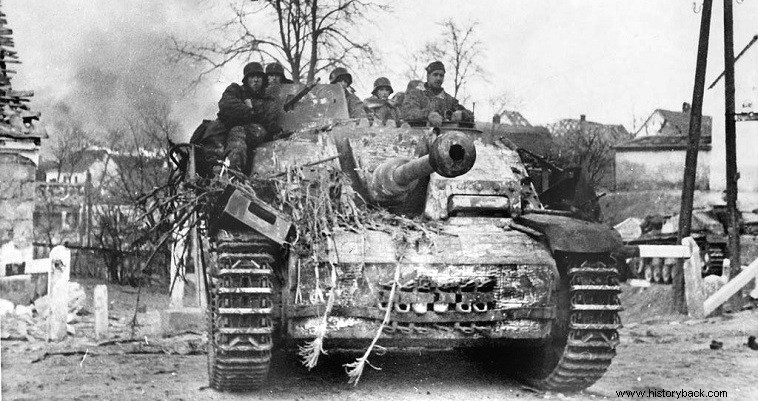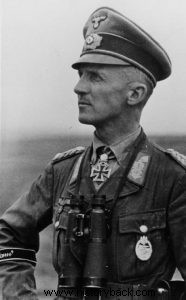
The fateful April 1945 for Hitler's Germany, the critical front on the Oder River, from its lower course to its mouth in the Baltic, was guarded by Army Group (OS) Vistula with the 9th Army (southern ) and the 3rd Panzer Army (3rd Panzer Army) to the north. The latter was under the command of a general with a "heavy" historical name, Hasso von Madeufel.
Opposite it was the Soviet 2nd Belorussian Front (2nd LM – equivalent to an army group formation) under Field Marshal Rokosovsky. The front of the 2nd LM extended to a length of 170 km and connected to the south with the forces of Marshal Zhukov. On April 16, Zhukov launched the offensive south, targeting Berlin. To the north, however, the flooded Oder did not allow Rokosovsky to attack.
The 2nd LM had 33 Rifle Divisions (MT), three divisions and several artillery brigades, with about 8,300 fire points, in addition to rocket launchers and about 950 armored. These forces were included in the 19th, 65th, 70th and 49th Armies and the 2nd Assault Army.
On the other side the 3rd Infantry Division had 11 nominally, mainly, divisions and 220 armored. These forces were distributed as follows:
– Defense area Svinemunde:402 Training Division and 3rd Naval Division (NM – with men from the navy without any experience in land combat)
– XXXII Army Corps (SS):549th People’s Grenadier Division – MLG (elderly men), Infantry Division (MP) Voigt (an improvised division made up of remnants of others), 281st MP and on 27 April was reinforced by remnants of the disbanded 7th Panzer Division ( BA).
– SS Oder:610 MP, the newly formed MP "Wellman" and the newly formed Brigade "Klosek".
– XXXXVI Panzer Army Corps (SSPA) with the 547th Infantry Division and the 1st NM.
The general reserve of the 3rd SS consisted of the 3rd SS SS with the 27th SS Division "Langemark", the 28th SS "Wallonia" (Belgian SS), the 18th Grenadier Panzer Division (MPa), the 15th SS (1st Latvian). However, most of the units from the said SS were removed from the command of the 3rd SS and were used elsewhere. In the midst of the battle, the also overworked 25th MPA
was also availableThe Soviets are out
The 2nd Army began offensive preparations from 16 April, at the same time that Zhukov was advancing against the German 9th Army to the south. The Soviet troops took up their advance positions and on the night of April 19-20 the Red Air Force began to attack the German positions. The Soviet 65th Army launched on 20 April and soon established a bridgehead on the west bank of the Oder. The 70th Army followed which also managed to establish a bridgehead, as did the 49th Army. Soon after Rokosowski threw the 2nd Assault Army into the fray, aiming to bypass the German fortified position at Szczecin to the north.
But Mandeuffel reacted by throwing into the battle all his available reserves, threatening the flank of the bridgehead of the Soviet 65th Army and managing to stop the other Soviet spikes. The next day, April 21, the Soviets continued their attacks, taking advantage of their terrifying numerical and material superiority, but without succeeding in breaking the German front. Only the next day, April 22, did the Soviet 70th Army achieve a narrow breakthrough in the Garts area. The Germans fought fiercely but eventually surrendered. About 300 surviving defenders managed to escape after fighting until April 24.
Meanwhile the situation to the south, in the sector of the German 9th Army, was developing disastrously for the Germans. The result of this was that the southern end of the 3rd Army was literally in the air. On April 25 the Soviet 70th Army extended its bridgehead allowing the engagement of General Panov's 1st Guards Tank Corps, whose tanks broke through the German defenses. Having thrown his meager reserves against the Soviet 65th Army, Mandeuffel lacked the strength to face the new threat.
Tough battles
Again the Germans managed, beyond all expectation, to stop the Soviet "road machine" but the respite was temporary as the Soviet 49th Army joined the 70th. The half-broken German 25th Infantry Division tried to counterattack. It only succeeded in delaying the Soviet masses. On April 26, the Soviet 65th Army crushed the opposing German forces and achieved a breach of 20 km.
After that Mandeuffel ordered his forces to retreat to a second line of defense. This line was occupied until April 27.
On this day the Soviet attack was repeated and the 3rd Infantry Division was forced to retreat again towards the area of the Mecklenburg Lakes. The 25th MPA together with the remnants of the 7th MPA tried to intercept the Soviets. At the same time, the 3rd Infantry Division was reinforced with the staff of the XXVII SS and remnants of the "Thousand and One Nights" Battle Group. Also available were other newly formed ones, of dubious if not non-existent combat value.
Pursue and Rescue
Mandeuffel's goal was no longer, of course, to intercept the Soviets or save Berlin, but only to save his men, retreat and hand them over to the West. Mandeuffel had retreated despite Hitler's orders, with the blessings of the commander of the Vistula Army, General Heinrich. The Soviets nevertheless continued the pursuit. On May 1 they stormed the small town of Demin, whose women suffered particularly.
Fighting continued until May 5 when the remnants of the 3rd Infantry along with many more soldiers and civilians crossed into the British zone. Indeed, in the city of Schwerin there was a small-scale conflict between the British and the Soviets, but it had no consequences. On May 7, Montgomery and Rokosofsky met in Wismar to arrange the details of the dividing line.
The fight of the 3rd Infantry Division could not succeed due to the balance of forces. What Mandeuffel achieved, fighting against the Soviets, but also against the folly of Hitler, was the rescue from Soviet captivity of tens of thousands of his compatriots. He himself was held prisoner until 1948.
Later he became a politician and was elected as a Member of Parliament with the Liberal Party. He played an important role in the reorganization of the German army but in 1959 he was sentenced to prison for ordering the execution of a deserter. He was soon released, however, he was privately held until the end of his life, in 1978.

Sergeant Hasso von Madeufel.
